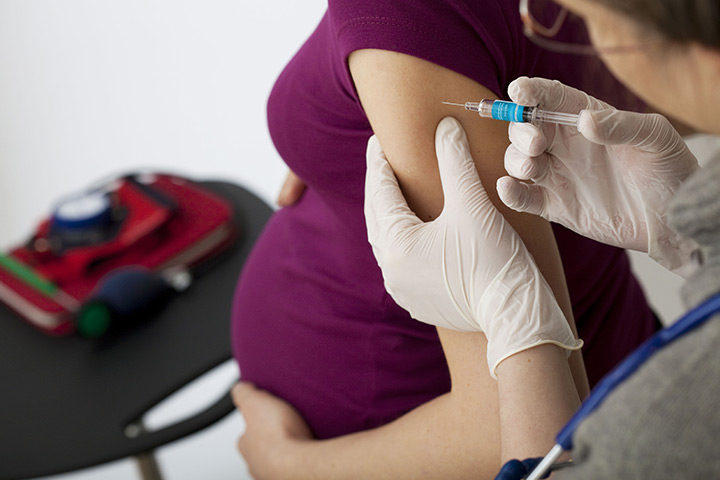Pregnancy is mostly about happiness and pampering, but you also need to understand that this is also the time when your weakened immune system makes you vulnerable to infections and illnesses. Some of these diseases can be quite harmful for you and your baby, and one such issue is tetanus. The infection can affect your unborn baby and cause serious complications. There are vaccinations available and it makes great sense to get a tetanus injection during pregnancy. Let's find out more about it.
Why Should You Have Tetanus Injection During Pregnancy?

You will have to take the Tetanus Toxoid (TT) vaccine during pregnancy to lower your risk of getting tetanus. Caused by the toxin of Clostridium tetani, tetanus is a life-threatening bacterial disease. The bacteria enter your body through an open wound, such as a cut, bite, or burn, but sometimes a tiny scratch or prick is enough to become infected.
The infection affects your nervous system and leads to serious complications when left untreated. You can prevent it through immunization because the vaccination will help form antibodies in the body that protect you and your baby from this infection.
When Is the Tetanus Injection Given During Pregnancy?
The American Congress of Obstetrics and Gynecologists (ACOG) recommend the following schedule for vaccinating pregnant women. Your healthcare provider will conduct through screening of your reports before giving you the immunization.
|
TT |
When to Give |
Effectiveness |
Expected Duration |
|
TT1 |
Soon after first contact or as early as possible after becoming pregnant |
NIL |
None |
|
TT2 |
After 4 weeks of getting the first shot |
80% |
1 to 3 years |
|
TT3 |
About 6 months after getting TT2 |
95% |
No less than 5 years |
|
TT4 |
About a year after getting TT3 or during subsequent pregnancy |
99% |
No less than 10 years |
|
TT5 |
About a year after getting TT4 or during subsequent pregnancy |
99% |
All childbearing years |
First Pregnancy Recommendations
Your healthcare provider will ask you to get at least two doses of the vaccine in your first pregnancy. The first dose is usually administered in the third trimester, whereas the second dose is administered at least four weeks after the first dose. You can also get a third vaccine about six months after your second dose to stay protect for at least five years. Some doctors may give you three doses after every four weeks – you get the first dose at 28 weeks of pregnancy.
Second Pregnancy Recommendations
If you become pregnant within two years of your first pregnancy, your doctor will first consider your vaccination history and then move further. You may only get a booster dose if you received TT vaccines during your previous pregnancy. You may have to get the vaccines again if there is a larger gap between your subsequent pregnancies.
More Vaccines and Pregnancy
Getting a tetanus injection during pregnancy can save you from dealing with serious complications, but you may also require other vaccines while pregnant. For instance:
Hepatitis B Vaccine
You can get a shot of hepatitis B vaccine even when you are pregnant. You should seriously think of getting vaccinated for the disease if you are a healthcare worker or you are living with a person who already has the disease. It is important to protect yourself from this viral infection because it causes liver inflammation as well as fatigue, nausea, and jaundice. It can also cause liver cancer, chronic liver disease, and death.
Keep in mind that if you contract this infection during pregnancy, you can also pass the infection to your baby during delivery. This puts your baby at a greater risk of developing serious liver diseases if you do not seek proper treatment.
Influenza
Receiving the vaccine for influenza protects you from serious illness during pregnancy. It is safe to receive the injectable vaccine at any time in your pregnancy, but you should not receive the nasal vaccine during pregnancy because the live vaccine can cause complications.
Vaccines You Should Avoid
It is important to understand that getting a tetanus injection during pregnancy can protect you from serious complications just like many other vaccinations. However, there are certain vaccines you should avoid when you are pregnant because they increase your risk of miscarriage, birth defects, and premature birth. For instance:
- Hepatitis A: It is not confirmed if getting this vaccine is safe during pregnancy, so it is better to avoid it during pregnancy.
- Measles, Mumps, Rubella (MMR): You should avoid becoming pregnant soon after receiving these live-virus vaccines – it is better to wait for at least a month after getting vaccinated to become pregnant.
- Varicella: You should get this vaccine at least a month before pregnancy to prevent chicken pox. Getting it before pregnancy will protect you from becoming seriously ill during pregnancy – it can also be harmful for your unborn baby.
- Pneumococcal: It is not confirmed if the pneumonia shot is harmful for pregnant women, but it is better to avoid it during pregnancy. You may consider getting it only when you have a chronic medical condition, such as kidney, heart, or lung disease.
- Inactivated Polio Vaccine (IPV) and Oral Polio Vaccine (OPV): You should not get these vaccines during pregnancy, and there is usually no need to get it considering the fact that the risk of getting polio in the U.S. is on the lower side.
